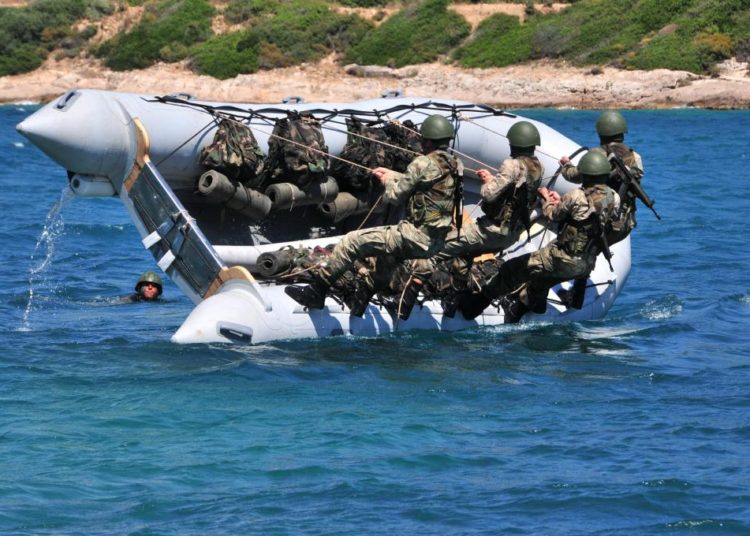Nordic Monitor
Turkey’s armed forces urged the courts to allow military members previously prohibited from leaving the country due to dubious terrorism charges to participate in military operations on foreign soil, secret documents obtained by Nordic Monitor have revealed.
Around 140,000 civil servants including military members were purged from their jobs without any effective judicial or administrative investigation and banned from leaving Turkey in the aftermath of a failed coup on July 15, 2016.
A review of the judicial documents shows that Turkey’s 10th Commando Brigade, located in Bitlis province, asked the Ankara 2nd Criminal Court of Peace, the Ankara West 2nd Criminal Court of Peace, the Gaziantep 5th Criminal Court of Peace, the Ordu 2nd Criminal Court of Peace and the Tatvan Criminal Court of Peace to lift the travel ban on five Turkish commandos who agreed to take part in Turkey’s still ongoing military offensive, code-named Operation Olive Branch, in Syria.
According to the documents, dated December 14, 2018 and signed by Col. Bülent Sayar, they were among the military forces to be deployed to northern Syria.

Turkey launched Operation Olive Branch, a military offensive against the Kurdish-administered enclave of Afrin in northern Syria, on January 20, 2018. Since then, the region has been controlled by Turkey and its Syrian proxies.
Military correspondence included a list of the commandos and a petition filed by Lt. Abdullah Dağ with the Ankara 2nd Criminal Court of Peace in which Dağ requested the lifting of a travel ban on him ordered by the court on October 27, 2016 pending investigation into his alleged links to a group critical of the government.
However, his petition was first conveyed to the Ankara Chief Public Prosecutor’s Office on December 19, 2018 and then to the Ankara 19th High Criminal Court on January 15, 2019 since the court of peace was not able to decide on the issue.
In another case, the 10th Commando Brigade followed the same method to forward the petition of Lt. İsmail Düver, who was also assigned to a mission in an area seized by Turkish forces during Operation Euphrates Shield. The petition underlined the fact that the order of the Ankara 2nd Criminal Court of Peace dated November 2, 2016 prevented him from joining the commando brigade.
Operation Euphrates Shield started on August 24, 2016 and concluded on March 31, 2017, but some Turkish troops remained in the region.
The documents sent by the 10th Commando Brigade on December 14, 2018 and August 13, 2018:
The new documents reveal the thin line between being defined as a “terrorist” or a “hero” in President Recep Tayyip Erdoğan’s Orwellian country governed by radical Islamist authoritarianism.
Some Turkish military personnel who have been labeled as terrorists by Turkish courts are praised as “martyrs of the nation” if they are killed in such operations. Turkish media recently reported that Lt. Çelebi Bozbıyık was killed during Turkey’s offensive into northeast Syria. Bozbıyık faced terrorism charges after the coup attempt and was detained on July 16, 2016 in Şanlıurfa despite the fact that he had no links to the abortive putsch.

During a state of emergency declared after the coup attempt that ended in July 2018, around 16,000 military members including top generals were purged from the army under government decrees due to alleged links to the Gülen movement, a civic group that is critical of the Erdoğan government for Turkey’s aiding and abetting of jihadists. According to local media reports, 716 of them were highly qualified pilots, more than half the total number of pilots in the Turkish Air Forces.
However the process still continues, and a total of 1,076 military staff have been dismissed since the end of the state of emergency. According to Defense Ministry sources 624 members of the land forces, 107 from the naval forces and 345 air forces members have been relieved of duty.
Turkish Interior Minister Süleyman Soylu announced in 2017 that the passports of 234,419 people had been cancelled to prevent them from leaving the country. Due to pressure from the EU and the Council of Europe, the Turkish parliament adopted a bill to facilitate the removal of barriers limiting freedom of expression. But a new regulation worsened the situation and put the Interior Ministry above the Turkish courts as the ultimate decision-maker on the issue. Despite the court rulings lifting travel bans, passports will be issued only after an “inquisition” by the Interior Ministry.
All the documents that show correspondence between military and judicial authorities are listed below:












